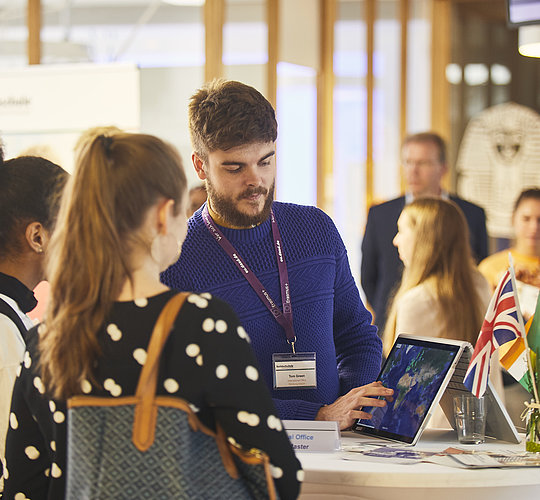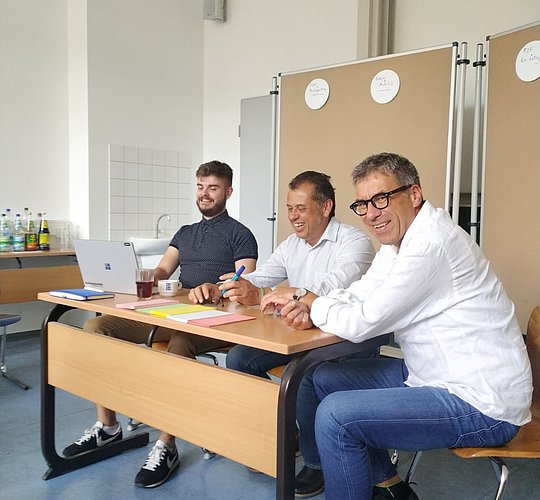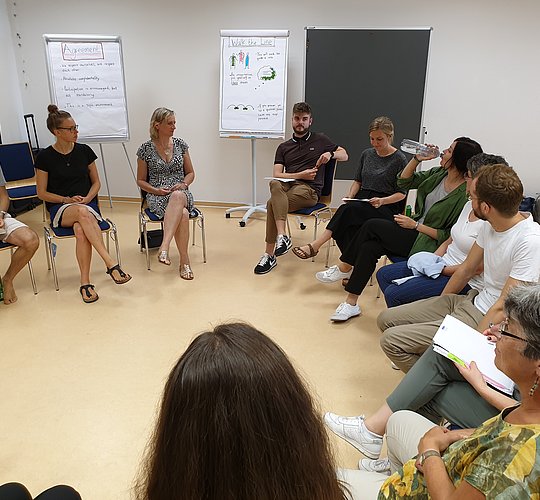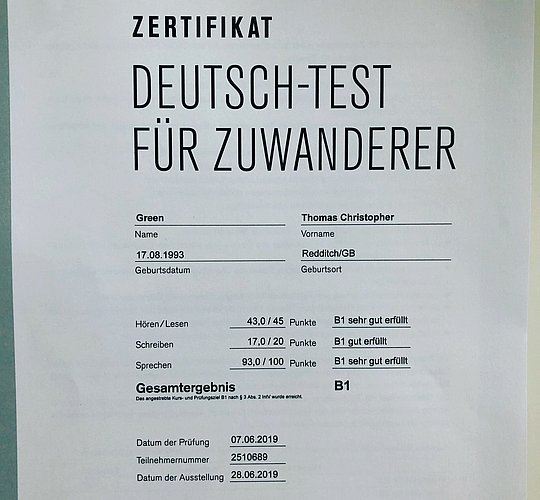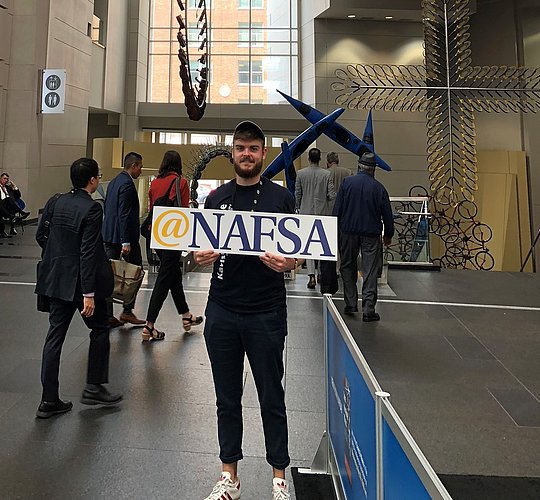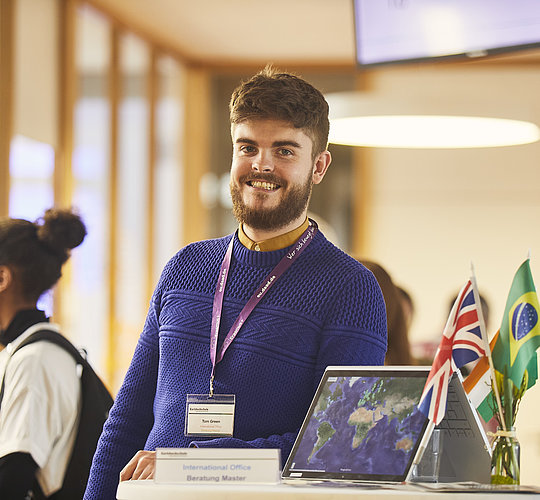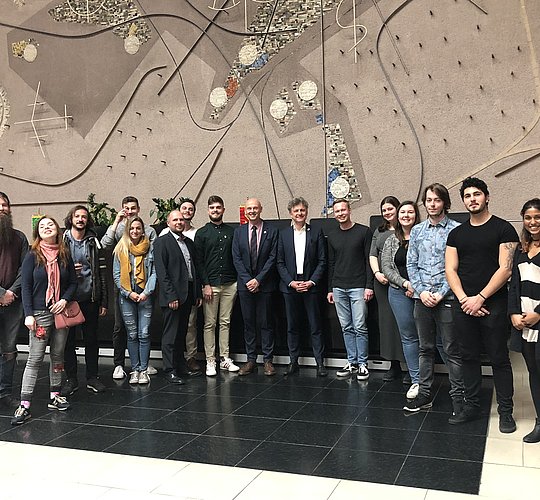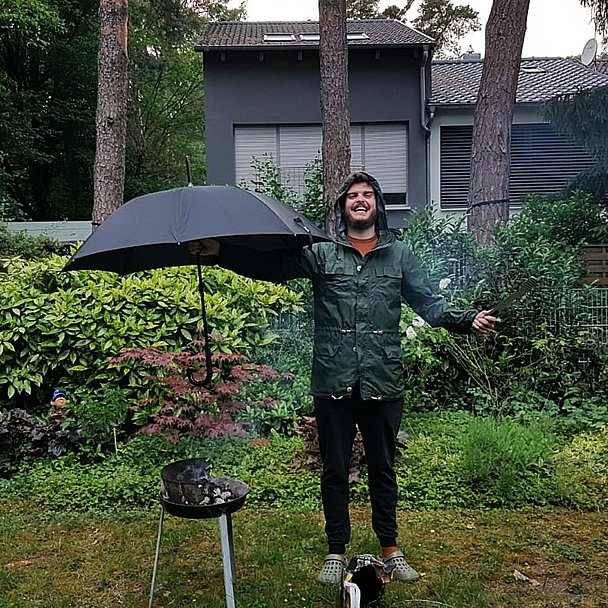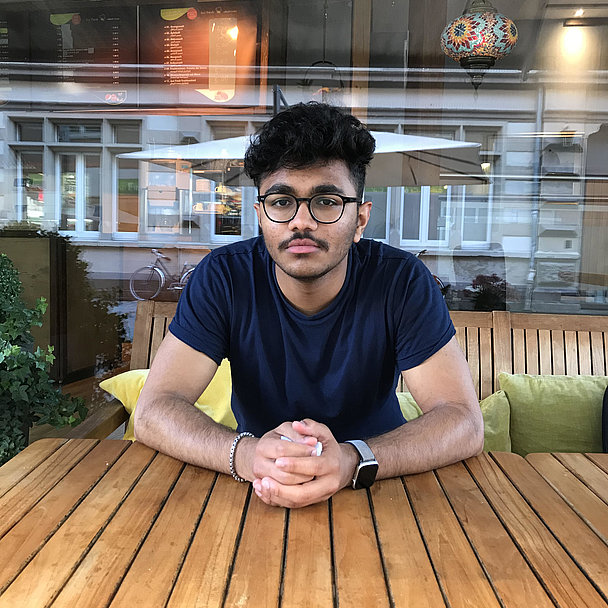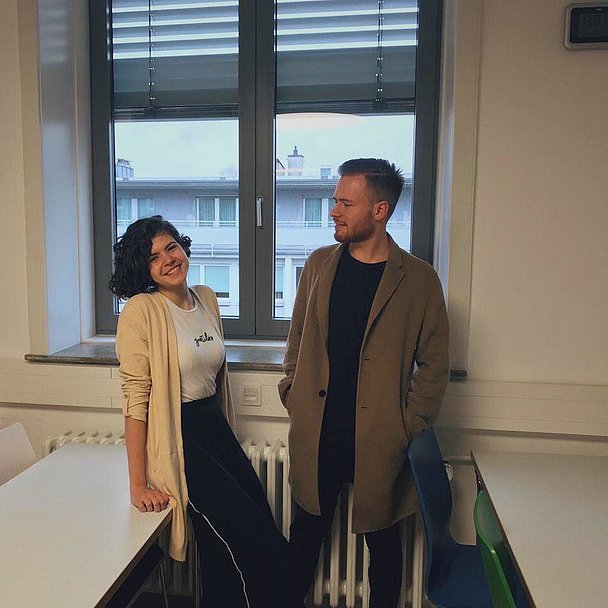Do you have further questions about Karls or your studies? Then just write me. I will be at your side with words and deeds and look forward to hear from you.
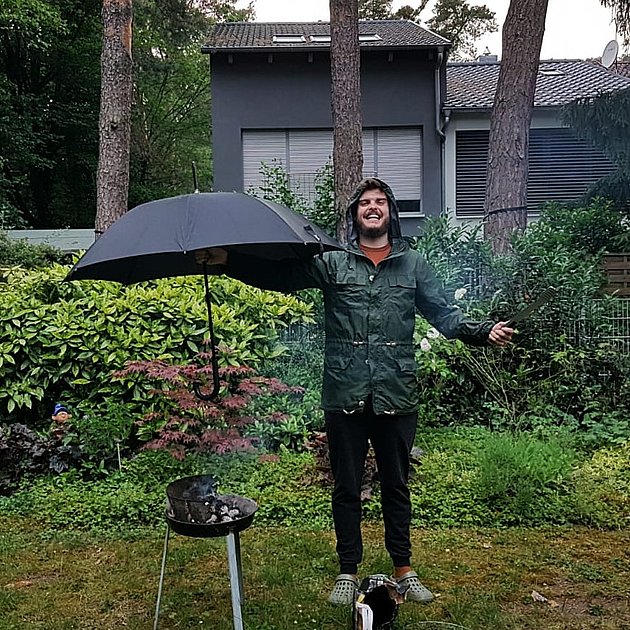

Tom Green
My name is Tom and I'm 26 years old. I'm originally from Birmingham and moved to Karlsruhe to do a masters degree at Karlshochschule. Coming to Germany changed my life, it was a huge life decision to make at that time, which wasn't by any means an easy one. With this said, I can confidently say the opportunities that I've been given and the development I feel I've undertaken through moving from the U.K. to Germany will last forever.
My decision to move here first came in 2014, I was in my final year of my bachelor degree at Newman University, Birmingham where I studied a B.A. in Business Management & I.T. I spontaneously attended the annual "Emerald Forest" Winter academy management simulation at Karlshochschule where I experienced my first real exchange; I met friends for life and tasted what it was like to learn and work in a genuinely intercultural and diverse environment. I received a scholarship to return to Karlshochschule through the ERASMUS+ network the same year for the 2014 AFS Intercultural Summer Academy. As I had never moved away from Birmingham to study as alot of my school friends had, when the chance to return to Germany for a post-grad degree arose, I considered it an unmissable opportunity. At first I really had the perception that only people born into money have such possibilities to move and study abroad, I wasn't until I actually came here I realised I was wrong. In March 2015, I sold my car and saved as much money as I could to finally move here to do a Masters in Management with specializations in Human Resources & Diversity and Brand.
Moving to Germany and experiencing the Karls as an international university has given me not only a unique experience, but competencies that have enabled me to push and better myself further than I ever imagined myself going. In our program, we learnt how to speak German, we learnt how to work and collaborate in intercultural settings, we learnt how to be critical, questioning the status quo, we learnt how to express ourselves confidently and clearly on a stage and most importantly, we learnt how to identify our personal development and progression; to then transfer into our everyday life. Now, four and a half years later, I work in the International Office at Karlshochschule as an Exchange / Mobility coordinator, my job is to maintain the relationships with our vast global network, to welcome and prepare our incoming exchange students to life in Germany and to ensure our outgoing students experience the opportunity of a lifetime when they go out on their semester abroad. Moving away from the U.K. has changed my perspective on life significantly, one in particular that stands out is realising that my passion lies within international education. As a personal objective, I see this ambassador program as my opportunity to encourage and inform like-minded people that moving to a different country to study is not as daunting or inaccessible as you may of initially thought with the potential of being one of the most rewarding life decisions you'll ever make.
The Birmingham Sunrise photo above was taken by professional freelance photographer @rogshafi - check out his instagram for more great photos of Birmingham.

News
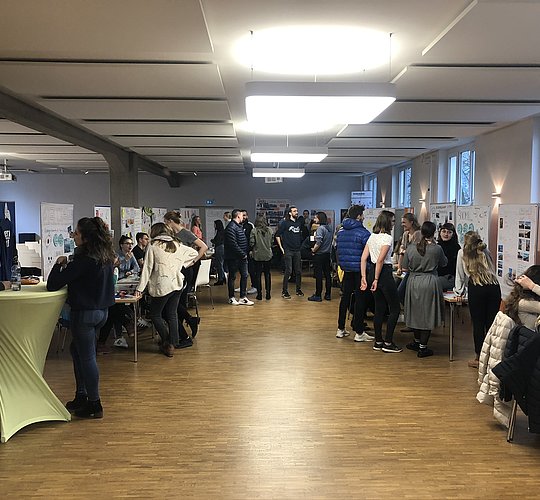
Semester Abroad Bridge Week 2020
Every year in the last week of January, the "Bridge Week" takes place at Karlshochschule. This is the time where all our 5th Semester IB, Management, IR and PPE students come back from their respective exchange destinations and back to Karls, just before they embark again on their next journey, the intergrated internship semester.
During this intensive week, the students will firstly reflect upon their abroad experiences with us in the International Office, and most importantly each other, through the framework of the Connect 2.0 project. The "Re-entry training" focuses on the last 6 months, identifying the process and personal development that all the students had gone through and how this can be transferred, then applied back into daily life. This workshop can be of great benefit to you as a Karls student for several reasons, firstly and clearly speaking, the semester abroad can be a transformative process, life-changing even; it can also be sometimes a difficult process as you are going to live in a new country, city and culture for almost half a year. A lot can happen in 6 months and sometimes upon coming back, a reflection is indeed necessary to "re-adapt" back into reality so to say. Not only that, discussions with fellow peers who have all been in the same position as you can bring realisations that you never even thought of, especially when it comes to identifying transferrable skills and competencies.
I am a massive advocate of educational mobility and the semester abroad (not just because of my job in the IO), I strongly believe the semester abroad is a fantastic opportunity that changes lives and genuinely changes perspectives. The great thing about this aspect within the sphere of academia is that it's becoming ever-more accessible. The next ERASMUS+ project announced by the European Commission from next year, 2021 to 2027 will be doubling it's overall budget, from around €15 Billion euros to a whopping €30 Billion euros. What does this mean for you? It means more opportunities via the ERASMUS+ network, it means more support for students studying in Europe to further progress in personal development and obtain new experiences. You can read the full proposal here and the official press release here for more information.
With all this said, the semester abroad is something that should be appreciated and not taken for granted, it is an opportunity that in the grand scheme of education, is still something not many students get the opportunity to experience. ERASMUS is just one of the networks stretching throughout the globe (yes, also outside of Europe with the International Credit Mobility scheme), that is pro-actively trying to encourage more people to jump outside of their reality to study, work, learn and live in other parts of the world.
Now my only hope is that the United Kingdom continues to participate in the ERASMUS+ programmes, but this all depends on the next 10 months with negotiations during the transition period. To not be a participating country within ERASMUS+ would be a significant blow to higher education in Britain. If you want to see concrete benefits of the study abroad, you can also read the report from @universitiesuk which really outlines how a study abroad experience can make you stand out of the crowd.
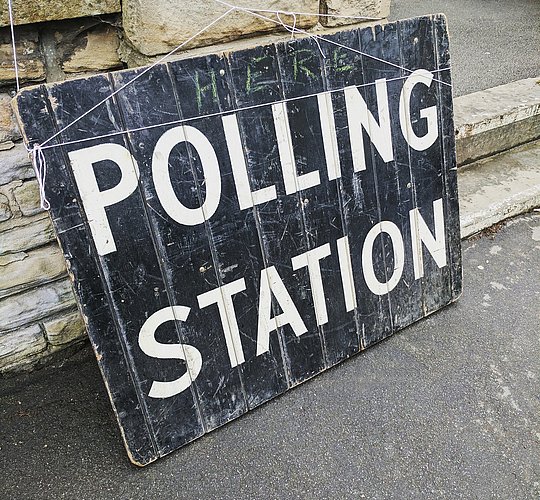
The U.K. General Election. 3 of 3.
12th December 2019. ELECTION DAY.
In today’s headlines, it is being labelled as the “most important general election in a generation”. For me, I definitely see it as a vote not just for Britain and its future (also with Europe); but my future and the prospects of my generation and future generations which will be affected by the actions undertaken by the next Parliament.
For Europe and the world observing the U.K, the spotlight is focused on what steps will be taken after this election over Brexit; a term which has even been officially added to the Oxford Dictionary. Although this is fundamentally one of the key influences in my ballot choice today, it’s also about the NHS, Education, Environmental policy and the foundation of democracy. In my opinion our political system has suffered heavily in its credibility and legitimacy over what feels like an eternity of stagnant debating, dirty politics and media-spins which has produced a country suffering from an ideological division.
The 2016 referendum empowered me to vote because of how the result would literally affect my personal situation, before this time I was, unfortunately like many others within my generation, disengaged in politics and didn’t understand why voting is so important. I think this time around, today’s election has really brought back the passion into politics and voting for many. The polarisation that we are witnessing within political ideologies on a scale bigger than just the U.K. and Europe (take the U.S.A for example), has sparked the call for people to stand up for what they believe in and actually go and vote, regardless of what or who it is they believe in. In a way I feel proud of standing up for what I believe in through casting my postal vote. Of course, the implications of this polarity have also encouraged perspectives towards othering “us vs. them” and facilitated strategies by parties to deliberately manipulate, misinform and sway decisions. Whatever the result is today, this is something which demands political reform and must be eliminated.
Having the legal right to vote and it’s importance is something we need to remember- you have a vote and a legal right to do so- it is something so easy to overlook or take for granted, there are cases all around the world where people have had to fight for this right.
If you aren’t sure what party to vote for- there are neutral platforms which can provide you with guidance, such as -> https://voteforpolicies.org.uk/.
Stand up for what you believe in and vote! I’ll be watching closely at the counting later.
Good luck Britain.
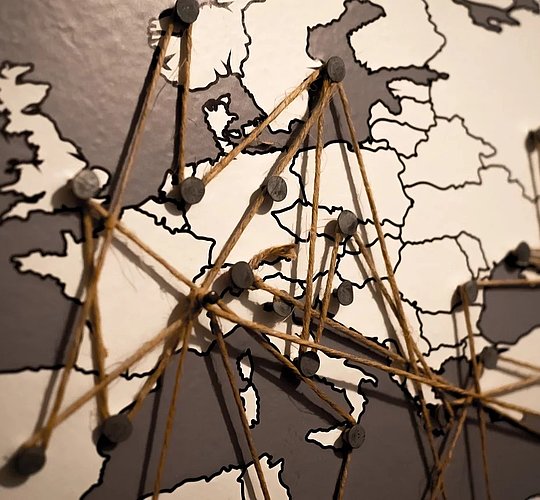
European Identity. 2 of 3.
I don’t know about others, but growing up in Birmingham I never really experienced the feeling of being “European”, rather just the feeling of being British. The concept of a single Europe was something not at all central to my values before or really the values of my social background. I don’t see a polarized difference between Germany and Britain and the perception of Europe, however I would say that moving to Karlsruhe did change my perspective in this significantly. I’m not sure if it’s because of the 2016 Referendum or not- but Germany, or at least Karlsruhe in my opinion, is a strong example of how an integrated Europe can operate. This is something I really started to feel when moving here, there is no way to confirm that everybody here feels European and believes in the EU, but I would say that in mainland Europe there is a strong sense of normalness to people moving freely for work, studying or “just because they can”. There are also lots of initiatives sponsored by the state to encourage integration such as subsidized language courses, policies to facilitate training for skills, recognize degrees and existing qualifications.
Karlsruhe as a city is extremely diverse for a town of its size. When specifically focusing on European citizens in Karlsruhe, there are people from all over the continent who move around for different reasons, it’s mainly work or study related as Baden-Württemberg is reputable for its business and technological strengths, alongside a good foundation of educational institutions and universities in the region. I feel welcomed here as a non-German in a very tolerant and accepting welcome culture.
Sometimes I think there is a detachment entwined within the British and European identity. There are several reasons for this; one of the reasons for a “social detachment” from Europe by some of the British population might be because of the geographical detachment between the British Isles and mainland Europe. For us Brits, to access Europe we either have to fly, take a boat or get the train via the Eurostar, it’s an interesting perspective to consider that normally, a lot of people from Britain might only go to Europe for a holiday, a short weekend break, or work-related visits. It is definitely more of a commitment, sometimes even effort and more expensive, for people to travel to mainland Europe (and vice-versa for those visiting the UK). Compared to other European countries, the number of British nationals living outside of the UK (excluding for retirement) to work, study is drastically low in comparison to other European nationals. Even just looking at the mobility figures in Higher Education in Britain; only 6.6% of UK undergraduate students study, work or volunteers overseas during their degree (with a national target of 13% by 2020) according to a report taken from Universities UK International -> full case report here. Compared to an increasing 25% in Germany (with a national target of 50% by 2020). The big shame here is there are a lot of students who aren’t aware of how accessible it can be to engage in an abroad mobility via higher education. It could be life changing and it might even be the easiest time to experience living abroad- with a safety net of two universities and financial aid via ERASMUS+ if applicable. According to the same study, those who go abroad within their degree are 7% higher average wage earners, six months after graduation. There are tons of opportunities waiting to be grabbed, sometimes I think me ending up in Germany was down to chance- I was in the right place, at the right time with the mindset to seize the opportunity that had been placed before me (my first mobility to Germany was partly funded via the ERASMUS+ network). I think this because it was never really advertised as a possibility beforehand, I genuinely thought you had to have lots of money behind you to do it.
Back to the topic of identity, the size of Britain and the fact that it is geographically not connected to another landmass I think impacts how people think about the rest of the world around them. When being in mainland Europe, it’s possible for you to take a train to anywhere else in Europe, Moscow, or even Beijing. From Britain, regardless of where you go, a border must be crossed with a different process than just jumping in your car (or the train) and ending up in another country. In my opinion this has an impact on Britain and how identifiable it can be, when thinking of Europe. This “separation” may also affect the impact of cross-cultural events or cooperative projects taking place between Britain other European countries.
A nice comparison to this, would be how the United Kingdom works with England, Wales, Scotland, Northern Ireland (and Ireland) when it comes to mobility and freedom of movement between borders, it would be borderless to go from England to Wales, or Scotland for a day, a weekend or a trip. This is how it feels when I’m in Germany and the rest of Europe- sometimes I’ve cycled to France, gone to Switzerland for the day, taken a bus to Italy, this year I even took a bus to Slovakia via the Czech Republic.
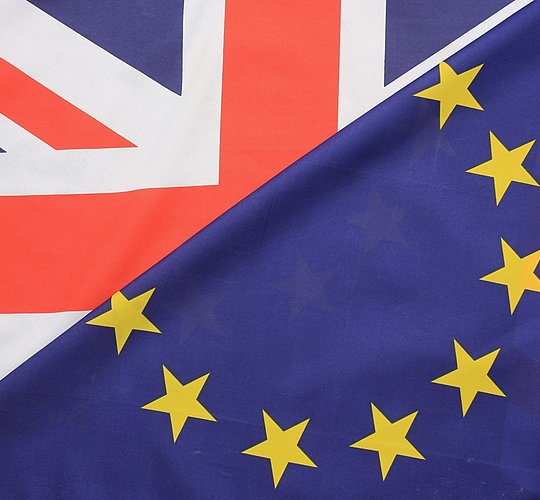
Brexit. 1 of 3.
I’ve decided at this crucial point in both British and European history to dedicate some of my next few ambassador posts about the metaphorical elephant in the room called Brexit. I’ve had several people approach me since I’ve started posting as the UK Karls ambassador, asking me why I haven’t already previously. So this will be officially the first post of three, discussing the in’s and out’s and what it’s like living in Germany since day one.
I don’t think voicing political opinion on social media is relevant as it’s not only a controversial instrument that can be utilized (as I’m sure we’ve all seen and experienced over the last 5 years) but also because it’s my view, and a subjective one at that. I have one perspective on the matter where there are hundreds of others that also should be considered when discussing the current political situation of Britain and its past, present and potential future relationship to the EU. That’s why I’m going to rather discuss the potential implications of Brexit, not from a political or social standpoint, but instead from the point of how it will directly affect me and my position as a British national living, working (and integrating) within mainland Europe and Germany.
I do feel that it’s incredibly important, however, to openly discuss the insights into my experiences as a Brit in Germany because I strongly believe Brexit should not discourage anyone from moving to Germany (or anywhere in Europe) to study, work and live. It could be, as I’ve always said, the best decision you’ll ever make. This is why I plan on diving into what it’s been like for me over an almost five-year period of living outside of the UK. Importantly, I want to address how studying in Karlsruhe full-time has had an impact on my perspectives towards certain things and in-turn, opened my eyes to an array of new opportunities (and possibilities).
So first and foremost, back to the literal implications. I know that for a lot of British students there is the underlying first question that springs to mind when even considering the thought of moving outside of the UK to study: “what will happen after Brexit?”.
Right now, there is no way (in my opinion, of course) that I, or anyone can give you a clear answer based on the last three and a half years of political decisions and advancements with the entire process. We can maybe have more of an insight after the December 12thsnap election which direction the UK will take, but after the years of delay and the historically huge, volatile stalemate in Parliament, we can still keep our options open into what actually will happen.
As it stands now, there are clear procedures in place from the side of the German government that will allow British nationals in Germany to “Keep Calm and Carry On” as usual. As it stands, there will be a three-month period where your right to live, work and study in Germany remains unchanged, with a potential six-month extension, easily giving you the opportunity to make an appointment with the local Ausländerbehörde (the local office for migration and asylum) and apply for a residence permit in Germany.
The conditions of this are yet to be determined regarding what documents and requirements you will need to get this approved as there is no universal regulation for all third-country nationals applying for visas and residence permits in Germany. There are different agreements with several countries that are established on a country-to-country basis.
Regarding the ERASMUS+ network, it is currently projected that funding will be secured until the end of 2020, providing that there is an exit on the basis of an agreed deal. This means that if you were looking to come to Germany on a semester abroad under an ERAMSUS mobility, you would still be eligible for financial support and there are even discussions for an extension for this period. The participation of the UK in ERASMUS after 2020 is not yet clear, though, and must still be established / agreed upon. I can now only assume that an agreement will be made between the UK and the EU to outline the specific requirements and processes, in the case of both a deal and no-deal Brexit.
What’s important to note is that I can say with confidence that I won’t need to pack my bags and leave immediately, nor will any other British national who is living in Germany. I have to say that from my experience here, there is in no way an unwelcoming or unfriendly attitude since the 2016 referendum; quite the contrary in fact. I have always felt very welcome here in Germany and have no-doubt that won’t change because of Brexit. I would say there is some level of sadness and maybe even sorrow in Germany (and Europe) about Brexit, as Britain does have a strong and positive role within the European Union as a founding country, but it’s never something that has been subject to negative or discriminatory behaviour towards me personally.
If you want more specific information on the status and rights of British nationals post-Brexit, you can check out the official website of BMI (Federal Ministry of Interior, Building and Community) and the official UK Government page on Living in Germany.
If you want more information on the status of ERASMUS+ and the UK’s participation in the mobility network- you can find more information here.
More of this to come in more posts! Next time I’ll be talking about values and European identity.

Semester Abroad Bridge Week 2020
Every year in the last week of January, the "Bridge Week" takes place at Karlshochschule. This is the time where all our 5th Semester IB, Management, IR and PPE students come back from their respective exchange destinations and back to Karls, just before they embark again on their next journey, the intergrated internship semester.
During this intensive week, the students will firstly reflect upon their abroad experiences with us in the International Office, and most importantly each other, through the framework of the Connect 2.0 project. The "Re-entry training" focuses on the last 6 months, identifying the process and personal development that all the students had gone through and how this can be transferred, then applied back into daily life. This workshop can be of great benefit to you as a Karls student for several reasons, firstly and clearly speaking, the semester abroad can be a transformative process, life-changing even; it can also be sometimes a difficult process as you are going to live in a new country, city and culture for almost half a year. A lot can happen in 6 months and sometimes upon coming back, a reflection is indeed necessary to "re-adapt" back into reality so to say. Not only that, discussions with fellow peers who have all been in the same position as you can bring realisations that you never even thought of, especially when it comes to identifying transferrable skills and competencies.
I am a massive advocate of educational mobility and the semester abroad (not just because of my job in the IO), I strongly believe the semester abroad is a fantastic opportunity that changes lives and genuinely changes perspectives. The great thing about this aspect within the sphere of academia is that it's becoming ever-more accessible. The next ERASMUS+ project announced by the European Commission from next year, 2021 to 2027 will be doubling it's overall budget, from around €15 Billion euros to a whopping €30 Billion euros. What does this mean for you? It means more opportunities via the ERASMUS+ network, it means more support for students studying in Europe to further progress in personal development and obtain new experiences. You can read the full proposal here and the official press release here for more information.
With all this said, the semester abroad is something that should be appreciated and not taken for granted, it is an opportunity that in the grand scheme of education, is still something not many students get the opportunity to experience. ERASMUS is just one of the networks stretching throughout the globe (yes, also outside of Europe with the International Credit Mobility scheme), that is pro-actively trying to encourage more people to jump outside of their reality to study, work, learn and live in other parts of the world.
Now my only hope is that the United Kingdom continues to participate in the ERASMUS+ programmes, but this all depends on the next 10 months with negotiations during the transition period. To not be a participating country within ERASMUS+ would be a significant blow to higher education in Britain. If you want to see concrete benefits of the study abroad, you can also read the report from @universitiesuk which really outlines how a study abroad experience can make you stand out of the crowd.

The U.K. General Election. 3 of 3.
12th December 2019. ELECTION DAY.
In today’s headlines, it is being labelled as the “most important general election in a generation”. For me, I definitely see it as a vote not just for Britain and its future (also with Europe); but my future and the prospects of my generation and future generations which will be affected by the actions undertaken by the next Parliament.
For Europe and the world observing the U.K, the spotlight is focused on what steps will be taken after this election over Brexit; a term which has even been officially added to the Oxford Dictionary. Although this is fundamentally one of the key influences in my ballot choice today, it’s also about the NHS, Education, Environmental policy and the foundation of democracy. In my opinion our political system has suffered heavily in its credibility and legitimacy over what feels like an eternity of stagnant debating, dirty politics and media-spins which has produced a country suffering from an ideological division.
The 2016 referendum empowered me to vote because of how the result would literally affect my personal situation, before this time I was, unfortunately like many others within my generation, disengaged in politics and didn’t understand why voting is so important. I think this time around, today’s election has really brought back the passion into politics and voting for many. The polarisation that we are witnessing within political ideologies on a scale bigger than just the U.K. and Europe (take the U.S.A for example), has sparked the call for people to stand up for what they believe in and actually go and vote, regardless of what or who it is they believe in. In a way I feel proud of standing up for what I believe in through casting my postal vote. Of course, the implications of this polarity have also encouraged perspectives towards othering “us vs. them” and facilitated strategies by parties to deliberately manipulate, misinform and sway decisions. Whatever the result is today, this is something which demands political reform and must be eliminated.
Having the legal right to vote and it’s importance is something we need to remember- you have a vote and a legal right to do so- it is something so easy to overlook or take for granted, there are cases all around the world where people have had to fight for this right.
If you aren’t sure what party to vote for- there are neutral platforms which can provide you with guidance, such as -> https://voteforpolicies.org.uk/.
Stand up for what you believe in and vote! I’ll be watching closely at the counting later.
Good luck Britain.

European Identity. 2 of 3.
I don’t know about others, but growing up in Birmingham I never really experienced the feeling of being “European”, rather just the feeling of being British. The concept of a single Europe was something not at all central to my values before or really the values of my social background. I don’t see a polarized difference between Germany and Britain and the perception of Europe, however I would say that moving to Karlsruhe did change my perspective in this significantly. I’m not sure if it’s because of the 2016 Referendum or not- but Germany, or at least Karlsruhe in my opinion, is a strong example of how an integrated Europe can operate. This is something I really started to feel when moving here, there is no way to confirm that everybody here feels European and believes in the EU, but I would say that in mainland Europe there is a strong sense of normalness to people moving freely for work, studying or “just because they can”. There are also lots of initiatives sponsored by the state to encourage integration such as subsidized language courses, policies to facilitate training for skills, recognize degrees and existing qualifications.
Karlsruhe as a city is extremely diverse for a town of its size. When specifically focusing on European citizens in Karlsruhe, there are people from all over the continent who move around for different reasons, it’s mainly work or study related as Baden-Württemberg is reputable for its business and technological strengths, alongside a good foundation of educational institutions and universities in the region. I feel welcomed here as a non-German in a very tolerant and accepting welcome culture.
Sometimes I think there is a detachment entwined within the British and European identity. There are several reasons for this; one of the reasons for a “social detachment” from Europe by some of the British population might be because of the geographical detachment between the British Isles and mainland Europe. For us Brits, to access Europe we either have to fly, take a boat or get the train via the Eurostar, it’s an interesting perspective to consider that normally, a lot of people from Britain might only go to Europe for a holiday, a short weekend break, or work-related visits. It is definitely more of a commitment, sometimes even effort and more expensive, for people to travel to mainland Europe (and vice-versa for those visiting the UK). Compared to other European countries, the number of British nationals living outside of the UK (excluding for retirement) to work, study is drastically low in comparison to other European nationals. Even just looking at the mobility figures in Higher Education in Britain; only 6.6% of UK undergraduate students study, work or volunteers overseas during their degree (with a national target of 13% by 2020) according to a report taken from Universities UK International -> full case report here. Compared to an increasing 25% in Germany (with a national target of 50% by 2020). The big shame here is there are a lot of students who aren’t aware of how accessible it can be to engage in an abroad mobility via higher education. It could be life changing and it might even be the easiest time to experience living abroad- with a safety net of two universities and financial aid via ERASMUS+ if applicable. According to the same study, those who go abroad within their degree are 7% higher average wage earners, six months after graduation. There are tons of opportunities waiting to be grabbed, sometimes I think me ending up in Germany was down to chance- I was in the right place, at the right time with the mindset to seize the opportunity that had been placed before me (my first mobility to Germany was partly funded via the ERASMUS+ network). I think this because it was never really advertised as a possibility beforehand, I genuinely thought you had to have lots of money behind you to do it.
Back to the topic of identity, the size of Britain and the fact that it is geographically not connected to another landmass I think impacts how people think about the rest of the world around them. When being in mainland Europe, it’s possible for you to take a train to anywhere else in Europe, Moscow, or even Beijing. From Britain, regardless of where you go, a border must be crossed with a different process than just jumping in your car (or the train) and ending up in another country. In my opinion this has an impact on Britain and how identifiable it can be, when thinking of Europe. This “separation” may also affect the impact of cross-cultural events or cooperative projects taking place between Britain other European countries.
A nice comparison to this, would be how the United Kingdom works with England, Wales, Scotland, Northern Ireland (and Ireland) when it comes to mobility and freedom of movement between borders, it would be borderless to go from England to Wales, or Scotland for a day, a weekend or a trip. This is how it feels when I’m in Germany and the rest of Europe- sometimes I’ve cycled to France, gone to Switzerland for the day, taken a bus to Italy, this year I even took a bus to Slovakia via the Czech Republic.

Brexit. 1 of 3.
I’ve decided at this crucial point in both British and European history to dedicate some of my next few ambassador posts about the metaphorical elephant in the room called Brexit. I’ve had several people approach me since I’ve started posting as the UK Karls ambassador, asking me why I haven’t already previously. So this will be officially the first post of three, discussing the in’s and out’s and what it’s like living in Germany since day one.
I don’t think voicing political opinion on social media is relevant as it’s not only a controversial instrument that can be utilized (as I’m sure we’ve all seen and experienced over the last 5 years) but also because it’s my view, and a subjective one at that. I have one perspective on the matter where there are hundreds of others that also should be considered when discussing the current political situation of Britain and its past, present and potential future relationship to the EU. That’s why I’m going to rather discuss the potential implications of Brexit, not from a political or social standpoint, but instead from the point of how it will directly affect me and my position as a British national living, working (and integrating) within mainland Europe and Germany.
I do feel that it’s incredibly important, however, to openly discuss the insights into my experiences as a Brit in Germany because I strongly believe Brexit should not discourage anyone from moving to Germany (or anywhere in Europe) to study, work and live. It could be, as I’ve always said, the best decision you’ll ever make. This is why I plan on diving into what it’s been like for me over an almost five-year period of living outside of the UK. Importantly, I want to address how studying in Karlsruhe full-time has had an impact on my perspectives towards certain things and in-turn, opened my eyes to an array of new opportunities (and possibilities).
So first and foremost, back to the literal implications. I know that for a lot of British students there is the underlying first question that springs to mind when even considering the thought of moving outside of the UK to study: “what will happen after Brexit?”.
Right now, there is no way (in my opinion, of course) that I, or anyone can give you a clear answer based on the last three and a half years of political decisions and advancements with the entire process. We can maybe have more of an insight after the December 12thsnap election which direction the UK will take, but after the years of delay and the historically huge, volatile stalemate in Parliament, we can still keep our options open into what actually will happen.
As it stands now, there are clear procedures in place from the side of the German government that will allow British nationals in Germany to “Keep Calm and Carry On” as usual. As it stands, there will be a three-month period where your right to live, work and study in Germany remains unchanged, with a potential six-month extension, easily giving you the opportunity to make an appointment with the local Ausländerbehörde (the local office for migration and asylum) and apply for a residence permit in Germany.
The conditions of this are yet to be determined regarding what documents and requirements you will need to get this approved as there is no universal regulation for all third-country nationals applying for visas and residence permits in Germany. There are different agreements with several countries that are established on a country-to-country basis.
Regarding the ERASMUS+ network, it is currently projected that funding will be secured until the end of 2020, providing that there is an exit on the basis of an agreed deal. This means that if you were looking to come to Germany on a semester abroad under an ERAMSUS mobility, you would still be eligible for financial support and there are even discussions for an extension for this period. The participation of the UK in ERASMUS after 2020 is not yet clear, though, and must still be established / agreed upon. I can now only assume that an agreement will be made between the UK and the EU to outline the specific requirements and processes, in the case of both a deal and no-deal Brexit.
What’s important to note is that I can say with confidence that I won’t need to pack my bags and leave immediately, nor will any other British national who is living in Germany. I have to say that from my experience here, there is in no way an unwelcoming or unfriendly attitude since the 2016 referendum; quite the contrary in fact. I have always felt very welcome here in Germany and have no-doubt that won’t change because of Brexit. I would say there is some level of sadness and maybe even sorrow in Germany (and Europe) about Brexit, as Britain does have a strong and positive role within the European Union as a founding country, but it’s never something that has been subject to negative or discriminatory behaviour towards me personally.
If you want more specific information on the status and rights of British nationals post-Brexit, you can check out the official website of BMI (Federal Ministry of Interior, Building and Community) and the official UK Government page on Living in Germany.
If you want more information on the status of ERASMUS+ and the UK’s participation in the mobility network- you can find more information here.
More of this to come in more posts! Next time I’ll be talking about values and European identity.

Semester Abroad Bridge Week 2020
Every year in the last week of January, the "Bridge Week" takes place at Karlshochschule. This is the time where all our 5th Semester IB, Management, IR and PPE students come back from their respective exchange destinations and back to Karls, just before they embark again on their next journey, the intergrated internship semester.
During this intensive week, the students will firstly reflect upon their abroad experiences with us in the International Office, and most importantly each other, through the framework of the Connect 2.0 project. The "Re-entry training" focuses on the last 6 months, identifying the process and personal development that all the students had gone through and how this can be transferred, then applied back into daily life. This workshop can be of great benefit to you as a Karls student for several reasons, firstly and clearly speaking, the semester abroad can be a transformative process, life-changing even; it can also be sometimes a difficult process as you are going to live in a new country, city and culture for almost half a year. A lot can happen in 6 months and sometimes upon coming back, a reflection is indeed necessary to "re-adapt" back into reality so to say. Not only that, discussions with fellow peers who have all been in the same position as you can bring realisations that you never even thought of, especially when it comes to identifying transferrable skills and competencies.
I am a massive advocate of educational mobility and the semester abroad (not just because of my job in the IO), I strongly believe the semester abroad is a fantastic opportunity that changes lives and genuinely changes perspectives. The great thing about this aspect within the sphere of academia is that it's becoming ever-more accessible. The next ERASMUS+ project announced by the European Commission from next year, 2021 to 2027 will be doubling it's overall budget, from around €15 Billion euros to a whopping €30 Billion euros. What does this mean for you? It means more opportunities via the ERASMUS+ network, it means more support for students studying in Europe to further progress in personal development and obtain new experiences. You can read the full proposal here and the official press release here for more information.
With all this said, the semester abroad is something that should be appreciated and not taken for granted, it is an opportunity that in the grand scheme of education, is still something not many students get the opportunity to experience. ERASMUS is just one of the networks stretching throughout the globe (yes, also outside of Europe with the International Credit Mobility scheme), that is pro-actively trying to encourage more people to jump outside of their reality to study, work, learn and live in other parts of the world.
Now my only hope is that the United Kingdom continues to participate in the ERASMUS+ programmes, but this all depends on the next 10 months with negotiations during the transition period. To not be a participating country within ERASMUS+ would be a significant blow to higher education in Britain. If you want to see concrete benefits of the study abroad, you can also read the report from @universitiesuk which really outlines how a study abroad experience can make you stand out of the crowd.

The U.K. General Election. 3 of 3.
12th December 2019. ELECTION DAY.
In today’s headlines, it is being labelled as the “most important general election in a generation”. For me, I definitely see it as a vote not just for Britain and its future (also with Europe); but my future and the prospects of my generation and future generations which will be affected by the actions undertaken by the next Parliament.
For Europe and the world observing the U.K, the spotlight is focused on what steps will be taken after this election over Brexit; a term which has even been officially added to the Oxford Dictionary. Although this is fundamentally one of the key influences in my ballot choice today, it’s also about the NHS, Education, Environmental policy and the foundation of democracy. In my opinion our political system has suffered heavily in its credibility and legitimacy over what feels like an eternity of stagnant debating, dirty politics and media-spins which has produced a country suffering from an ideological division.
The 2016 referendum empowered me to vote because of how the result would literally affect my personal situation, before this time I was, unfortunately like many others within my generation, disengaged in politics and didn’t understand why voting is so important. I think this time around, today’s election has really brought back the passion into politics and voting for many. The polarisation that we are witnessing within political ideologies on a scale bigger than just the U.K. and Europe (take the U.S.A for example), has sparked the call for people to stand up for what they believe in and actually go and vote, regardless of what or who it is they believe in. In a way I feel proud of standing up for what I believe in through casting my postal vote. Of course, the implications of this polarity have also encouraged perspectives towards othering “us vs. them” and facilitated strategies by parties to deliberately manipulate, misinform and sway decisions. Whatever the result is today, this is something which demands political reform and must be eliminated.
Having the legal right to vote and it’s importance is something we need to remember- you have a vote and a legal right to do so- it is something so easy to overlook or take for granted, there are cases all around the world where people have had to fight for this right.
If you aren’t sure what party to vote for- there are neutral platforms which can provide you with guidance, such as -> https://voteforpolicies.org.uk/.
Stand up for what you believe in and vote! I’ll be watching closely at the counting later.
Good luck Britain.

European Identity. 2 of 3.
I don’t know about others, but growing up in Birmingham I never really experienced the feeling of being “European”, rather just the feeling of being British. The concept of a single Europe was something not at all central to my values before or really the values of my social background. I don’t see a polarized difference between Germany and Britain and the perception of Europe, however I would say that moving to Karlsruhe did change my perspective in this significantly. I’m not sure if it’s because of the 2016 Referendum or not- but Germany, or at least Karlsruhe in my opinion, is a strong example of how an integrated Europe can operate. This is something I really started to feel when moving here, there is no way to confirm that everybody here feels European and believes in the EU, but I would say that in mainland Europe there is a strong sense of normalness to people moving freely for work, studying or “just because they can”. There are also lots of initiatives sponsored by the state to encourage integration such as subsidized language courses, policies to facilitate training for skills, recognize degrees and existing qualifications.
Karlsruhe as a city is extremely diverse for a town of its size. When specifically focusing on European citizens in Karlsruhe, there are people from all over the continent who move around for different reasons, it’s mainly work or study related as Baden-Württemberg is reputable for its business and technological strengths, alongside a good foundation of educational institutions and universities in the region. I feel welcomed here as a non-German in a very tolerant and accepting welcome culture.
Sometimes I think there is a detachment entwined within the British and European identity. There are several reasons for this; one of the reasons for a “social detachment” from Europe by some of the British population might be because of the geographical detachment between the British Isles and mainland Europe. For us Brits, to access Europe we either have to fly, take a boat or get the train via the Eurostar, it’s an interesting perspective to consider that normally, a lot of people from Britain might only go to Europe for a holiday, a short weekend break, or work-related visits. It is definitely more of a commitment, sometimes even effort and more expensive, for people to travel to mainland Europe (and vice-versa for those visiting the UK). Compared to other European countries, the number of British nationals living outside of the UK (excluding for retirement) to work, study is drastically low in comparison to other European nationals. Even just looking at the mobility figures in Higher Education in Britain; only 6.6% of UK undergraduate students study, work or volunteers overseas during their degree (with a national target of 13% by 2020) according to a report taken from Universities UK International -> full case report here. Compared to an increasing 25% in Germany (with a national target of 50% by 2020). The big shame here is there are a lot of students who aren’t aware of how accessible it can be to engage in an abroad mobility via higher education. It could be life changing and it might even be the easiest time to experience living abroad- with a safety net of two universities and financial aid via ERASMUS+ if applicable. According to the same study, those who go abroad within their degree are 7% higher average wage earners, six months after graduation. There are tons of opportunities waiting to be grabbed, sometimes I think me ending up in Germany was down to chance- I was in the right place, at the right time with the mindset to seize the opportunity that had been placed before me (my first mobility to Germany was partly funded via the ERASMUS+ network). I think this because it was never really advertised as a possibility beforehand, I genuinely thought you had to have lots of money behind you to do it.
Back to the topic of identity, the size of Britain and the fact that it is geographically not connected to another landmass I think impacts how people think about the rest of the world around them. When being in mainland Europe, it’s possible for you to take a train to anywhere else in Europe, Moscow, or even Beijing. From Britain, regardless of where you go, a border must be crossed with a different process than just jumping in your car (or the train) and ending up in another country. In my opinion this has an impact on Britain and how identifiable it can be, when thinking of Europe. This “separation” may also affect the impact of cross-cultural events or cooperative projects taking place between Britain other European countries.
A nice comparison to this, would be how the United Kingdom works with England, Wales, Scotland, Northern Ireland (and Ireland) when it comes to mobility and freedom of movement between borders, it would be borderless to go from England to Wales, or Scotland for a day, a weekend or a trip. This is how it feels when I’m in Germany and the rest of Europe- sometimes I’ve cycled to France, gone to Switzerland for the day, taken a bus to Italy, this year I even took a bus to Slovakia via the Czech Republic.

Brexit. 1 of 3.
I’ve decided at this crucial point in both British and European history to dedicate some of my next few ambassador posts about the metaphorical elephant in the room called Brexit. I’ve had several people approach me since I’ve started posting as the UK Karls ambassador, asking me why I haven’t already previously. So this will be officially the first post of three, discussing the in’s and out’s and what it’s like living in Germany since day one.
I don’t think voicing political opinion on social media is relevant as it’s not only a controversial instrument that can be utilized (as I’m sure we’ve all seen and experienced over the last 5 years) but also because it’s my view, and a subjective one at that. I have one perspective on the matter where there are hundreds of others that also should be considered when discussing the current political situation of Britain and its past, present and potential future relationship to the EU. That’s why I’m going to rather discuss the potential implications of Brexit, not from a political or social standpoint, but instead from the point of how it will directly affect me and my position as a British national living, working (and integrating) within mainland Europe and Germany.
I do feel that it’s incredibly important, however, to openly discuss the insights into my experiences as a Brit in Germany because I strongly believe Brexit should not discourage anyone from moving to Germany (or anywhere in Europe) to study, work and live. It could be, as I’ve always said, the best decision you’ll ever make. This is why I plan on diving into what it’s been like for me over an almost five-year period of living outside of the UK. Importantly, I want to address how studying in Karlsruhe full-time has had an impact on my perspectives towards certain things and in-turn, opened my eyes to an array of new opportunities (and possibilities).
So first and foremost, back to the literal implications. I know that for a lot of British students there is the underlying first question that springs to mind when even considering the thought of moving outside of the UK to study: “what will happen after Brexit?”.
Right now, there is no way (in my opinion, of course) that I, or anyone can give you a clear answer based on the last three and a half years of political decisions and advancements with the entire process. We can maybe have more of an insight after the December 12thsnap election which direction the UK will take, but after the years of delay and the historically huge, volatile stalemate in Parliament, we can still keep our options open into what actually will happen.
As it stands now, there are clear procedures in place from the side of the German government that will allow British nationals in Germany to “Keep Calm and Carry On” as usual. As it stands, there will be a three-month period where your right to live, work and study in Germany remains unchanged, with a potential six-month extension, easily giving you the opportunity to make an appointment with the local Ausländerbehörde (the local office for migration and asylum) and apply for a residence permit in Germany.
The conditions of this are yet to be determined regarding what documents and requirements you will need to get this approved as there is no universal regulation for all third-country nationals applying for visas and residence permits in Germany. There are different agreements with several countries that are established on a country-to-country basis.
Regarding the ERASMUS+ network, it is currently projected that funding will be secured until the end of 2020, providing that there is an exit on the basis of an agreed deal. This means that if you were looking to come to Germany on a semester abroad under an ERAMSUS mobility, you would still be eligible for financial support and there are even discussions for an extension for this period. The participation of the UK in ERASMUS after 2020 is not yet clear, though, and must still be established / agreed upon. I can now only assume that an agreement will be made between the UK and the EU to outline the specific requirements and processes, in the case of both a deal and no-deal Brexit.
What’s important to note is that I can say with confidence that I won’t need to pack my bags and leave immediately, nor will any other British national who is living in Germany. I have to say that from my experience here, there is in no way an unwelcoming or unfriendly attitude since the 2016 referendum; quite the contrary in fact. I have always felt very welcome here in Germany and have no-doubt that won’t change because of Brexit. I would say there is some level of sadness and maybe even sorrow in Germany (and Europe) about Brexit, as Britain does have a strong and positive role within the European Union as a founding country, but it’s never something that has been subject to negative or discriminatory behaviour towards me personally.
If you want more specific information on the status and rights of British nationals post-Brexit, you can check out the official website of BMI (Federal Ministry of Interior, Building and Community) and the official UK Government page on Living in Germany.
If you want more information on the status of ERASMUS+ and the UK’s participation in the mobility network- you can find more information here.
More of this to come in more posts! Next time I’ll be talking about values and European identity.

Semester Abroad Bridge Week 2020
Every year in the last week of January, the "Bridge Week" takes place at Karlshochschule. This is the time where all our 5th Semester IB, Management, IR and PPE students come back from their respective exchange destinations and back to Karls, just before they embark again on their next journey, the intergrated internship semester.
During this intensive week, the students will firstly reflect upon their abroad experiences with us in the International Office, and most importantly each other, through the framework of the Connect 2.0 project. The "Re-entry training" focuses on the last 6 months, identifying the process and personal development that all the students had gone through and how this can be transferred, then applied back into daily life. This workshop can be of great benefit to you as a Karls student for several reasons, firstly and clearly speaking, the semester abroad can be a transformative process, life-changing even; it can also be sometimes a difficult process as you are going to live in a new country, city and culture for almost half a year. A lot can happen in 6 months and sometimes upon coming back, a reflection is indeed necessary to "re-adapt" back into reality so to say. Not only that, discussions with fellow peers who have all been in the same position as you can bring realisations that you never even thought of, especially when it comes to identifying transferrable skills and competencies.
I am a massive advocate of educational mobility and the semester abroad (not just because of my job in the IO), I strongly believe the semester abroad is a fantastic opportunity that changes lives and genuinely changes perspectives. The great thing about this aspect within the sphere of academia is that it's becoming ever-more accessible. The next ERASMUS+ project announced by the European Commission from next year, 2021 to 2027 will be doubling it's overall budget, from around €15 Billion euros to a whopping €30 Billion euros. What does this mean for you? It means more opportunities via the ERASMUS+ network, it means more support for students studying in Europe to further progress in personal development and obtain new experiences. You can read the full proposal here and the official press release here for more information.
With all this said, the semester abroad is something that should be appreciated and not taken for granted, it is an opportunity that in the grand scheme of education, is still something not many students get the opportunity to experience. ERASMUS is just one of the networks stretching throughout the globe (yes, also outside of Europe with the International Credit Mobility scheme), that is pro-actively trying to encourage more people to jump outside of their reality to study, work, learn and live in other parts of the world.
Now my only hope is that the United Kingdom continues to participate in the ERASMUS+ programmes, but this all depends on the next 10 months with negotiations during the transition period. To not be a participating country within ERASMUS+ would be a significant blow to higher education in Britain. If you want to see concrete benefits of the study abroad, you can also read the report from @universitiesuk which really outlines how a study abroad experience can make you stand out of the crowd.

The U.K. General Election. 3 of 3.
12th December 2019. ELECTION DAY.
In today’s headlines, it is being labelled as the “most important general election in a generation”. For me, I definitely see it as a vote not just for Britain and its future (also with Europe); but my future and the prospects of my generation and future generations which will be affected by the actions undertaken by the next Parliament.
For Europe and the world observing the U.K, the spotlight is focused on what steps will be taken after this election over Brexit; a term which has even been officially added to the Oxford Dictionary. Although this is fundamentally one of the key influences in my ballot choice today, it’s also about the NHS, Education, Environmental policy and the foundation of democracy. In my opinion our political system has suffered heavily in its credibility and legitimacy over what feels like an eternity of stagnant debating, dirty politics and media-spins which has produced a country suffering from an ideological division.
The 2016 referendum empowered me to vote because of how the result would literally affect my personal situation, before this time I was, unfortunately like many others within my generation, disengaged in politics and didn’t understand why voting is so important. I think this time around, today’s election has really brought back the passion into politics and voting for many. The polarisation that we are witnessing within political ideologies on a scale bigger than just the U.K. and Europe (take the U.S.A for example), has sparked the call for people to stand up for what they believe in and actually go and vote, regardless of what or who it is they believe in. In a way I feel proud of standing up for what I believe in through casting my postal vote. Of course, the implications of this polarity have also encouraged perspectives towards othering “us vs. them” and facilitated strategies by parties to deliberately manipulate, misinform and sway decisions. Whatever the result is today, this is something which demands political reform and must be eliminated.
Having the legal right to vote and it’s importance is something we need to remember- you have a vote and a legal right to do so- it is something so easy to overlook or take for granted, there are cases all around the world where people have had to fight for this right.
If you aren’t sure what party to vote for- there are neutral platforms which can provide you with guidance, such as -> https://voteforpolicies.org.uk/.
Stand up for what you believe in and vote! I’ll be watching closely at the counting later.
Good luck Britain.

European Identity. 2 of 3.
I don’t know about others, but growing up in Birmingham I never really experienced the feeling of being “European”, rather just the feeling of being British. The concept of a single Europe was something not at all central to my values before or really the values of my social background. I don’t see a polarized difference between Germany and Britain and the perception of Europe, however I would say that moving to Karlsruhe did change my perspective in this significantly. I’m not sure if it’s because of the 2016 Referendum or not- but Germany, or at least Karlsruhe in my opinion, is a strong example of how an integrated Europe can operate. This is something I really started to feel when moving here, there is no way to confirm that everybody here feels European and believes in the EU, but I would say that in mainland Europe there is a strong sense of normalness to people moving freely for work, studying or “just because they can”. There are also lots of initiatives sponsored by the state to encourage integration such as subsidized language courses, policies to facilitate training for skills, recognize degrees and existing qualifications.
Karlsruhe as a city is extremely diverse for a town of its size. When specifically focusing on European citizens in Karlsruhe, there are people from all over the continent who move around for different reasons, it’s mainly work or study related as Baden-Württemberg is reputable for its business and technological strengths, alongside a good foundation of educational institutions and universities in the region. I feel welcomed here as a non-German in a very tolerant and accepting welcome culture.
Sometimes I think there is a detachment entwined within the British and European identity. There are several reasons for this; one of the reasons for a “social detachment” from Europe by some of the British population might be because of the geographical detachment between the British Isles and mainland Europe. For us Brits, to access Europe we either have to fly, take a boat or get the train via the Eurostar, it’s an interesting perspective to consider that normally, a lot of people from Britain might only go to Europe for a holiday, a short weekend break, or work-related visits. It is definitely more of a commitment, sometimes even effort and more expensive, for people to travel to mainland Europe (and vice-versa for those visiting the UK). Compared to other European countries, the number of British nationals living outside of the UK (excluding for retirement) to work, study is drastically low in comparison to other European nationals. Even just looking at the mobility figures in Higher Education in Britain; only 6.6% of UK undergraduate students study, work or volunteers overseas during their degree (with a national target of 13% by 2020) according to a report taken from Universities UK International -> full case report here. Compared to an increasing 25% in Germany (with a national target of 50% by 2020). The big shame here is there are a lot of students who aren’t aware of how accessible it can be to engage in an abroad mobility via higher education. It could be life changing and it might even be the easiest time to experience living abroad- with a safety net of two universities and financial aid via ERASMUS+ if applicable. According to the same study, those who go abroad within their degree are 7% higher average wage earners, six months after graduation. There are tons of opportunities waiting to be grabbed, sometimes I think me ending up in Germany was down to chance- I was in the right place, at the right time with the mindset to seize the opportunity that had been placed before me (my first mobility to Germany was partly funded via the ERASMUS+ network). I think this because it was never really advertised as a possibility beforehand, I genuinely thought you had to have lots of money behind you to do it.
Back to the topic of identity, the size of Britain and the fact that it is geographically not connected to another landmass I think impacts how people think about the rest of the world around them. When being in mainland Europe, it’s possible for you to take a train to anywhere else in Europe, Moscow, or even Beijing. From Britain, regardless of where you go, a border must be crossed with a different process than just jumping in your car (or the train) and ending up in another country. In my opinion this has an impact on Britain and how identifiable it can be, when thinking of Europe. This “separation” may also affect the impact of cross-cultural events or cooperative projects taking place between Britain other European countries.
A nice comparison to this, would be how the United Kingdom works with England, Wales, Scotland, Northern Ireland (and Ireland) when it comes to mobility and freedom of movement between borders, it would be borderless to go from England to Wales, or Scotland for a day, a weekend or a trip. This is how it feels when I’m in Germany and the rest of Europe- sometimes I’ve cycled to France, gone to Switzerland for the day, taken a bus to Italy, this year I even took a bus to Slovakia via the Czech Republic.

Brexit. 1 of 3.
I’ve decided at this crucial point in both British and European history to dedicate some of my next few ambassador posts about the metaphorical elephant in the room called Brexit. I’ve had several people approach me since I’ve started posting as the UK Karls ambassador, asking me why I haven’t already previously. So this will be officially the first post of three, discussing the in’s and out’s and what it’s like living in Germany since day one.
I don’t think voicing political opinion on social media is relevant as it’s not only a controversial instrument that can be utilized (as I’m sure we’ve all seen and experienced over the last 5 years) but also because it’s my view, and a subjective one at that. I have one perspective on the matter where there are hundreds of others that also should be considered when discussing the current political situation of Britain and its past, present and potential future relationship to the EU. That’s why I’m going to rather discuss the potential implications of Brexit, not from a political or social standpoint, but instead from the point of how it will directly affect me and my position as a British national living, working (and integrating) within mainland Europe and Germany.
I do feel that it’s incredibly important, however, to openly discuss the insights into my experiences as a Brit in Germany because I strongly believe Brexit should not discourage anyone from moving to Germany (or anywhere in Europe) to study, work and live. It could be, as I’ve always said, the best decision you’ll ever make. This is why I plan on diving into what it’s been like for me over an almost five-year period of living outside of the UK. Importantly, I want to address how studying in Karlsruhe full-time has had an impact on my perspectives towards certain things and in-turn, opened my eyes to an array of new opportunities (and possibilities).
So first and foremost, back to the literal implications. I know that for a lot of British students there is the underlying first question that springs to mind when even considering the thought of moving outside of the UK to study: “what will happen after Brexit?”.
Right now, there is no way (in my opinion, of course) that I, or anyone can give you a clear answer based on the last three and a half years of political decisions and advancements with the entire process. We can maybe have more of an insight after the December 12thsnap election which direction the UK will take, but after the years of delay and the historically huge, volatile stalemate in Parliament, we can still keep our options open into what actually will happen.
As it stands now, there are clear procedures in place from the side of the German government that will allow British nationals in Germany to “Keep Calm and Carry On” as usual. As it stands, there will be a three-month period where your right to live, work and study in Germany remains unchanged, with a potential six-month extension, easily giving you the opportunity to make an appointment with the local Ausländerbehörde (the local office for migration and asylum) and apply for a residence permit in Germany.
The conditions of this are yet to be determined regarding what documents and requirements you will need to get this approved as there is no universal regulation for all third-country nationals applying for visas and residence permits in Germany. There are different agreements with several countries that are established on a country-to-country basis.
Regarding the ERASMUS+ network, it is currently projected that funding will be secured until the end of 2020, providing that there is an exit on the basis of an agreed deal. This means that if you were looking to come to Germany on a semester abroad under an ERAMSUS mobility, you would still be eligible for financial support and there are even discussions for an extension for this period. The participation of the UK in ERASMUS after 2020 is not yet clear, though, and must still be established / agreed upon. I can now only assume that an agreement will be made between the UK and the EU to outline the specific requirements and processes, in the case of both a deal and no-deal Brexit.
What’s important to note is that I can say with confidence that I won’t need to pack my bags and leave immediately, nor will any other British national who is living in Germany. I have to say that from my experience here, there is in no way an unwelcoming or unfriendly attitude since the 2016 referendum; quite the contrary in fact. I have always felt very welcome here in Germany and have no-doubt that won’t change because of Brexit. I would say there is some level of sadness and maybe even sorrow in Germany (and Europe) about Brexit, as Britain does have a strong and positive role within the European Union as a founding country, but it’s never something that has been subject to negative or discriminatory behaviour towards me personally.
If you want more specific information on the status and rights of British nationals post-Brexit, you can check out the official website of BMI (Federal Ministry of Interior, Building and Community) and the official UK Government page on Living in Germany.
If you want more information on the status of ERASMUS+ and the UK’s participation in the mobility network- you can find more information here.
More of this to come in more posts! Next time I’ll be talking about values and European identity.

The U.K. General Election. 3 of 3.
12th December 2019. ELECTION DAY.
In today’s headlines, it is being labelled as the “most important general election in a generation”. For me, I definitely see it as a vote not just for Britain and its future (also with Europe); but my future and the prospects of my generation and future generations which will be affected by the actions undertaken by the next Parliament.
For Europe and the world observing the U.K, the spotlight is focused on what steps will be taken after this election over Brexit; a term which has even been officially added to the Oxford Dictionary. Although this is fundamentally one of the key influences in my ballot choice today, it’s also about the NHS, Education, Environmental policy and the foundation of democracy. In my opinion our political system has suffered heavily in its credibility and legitimacy over what feels like an eternity of stagnant debating, dirty politics and media-spins which has produced a country suffering from an ideological division.
The 2016 referendum empowered me to vote because of how the result would literally affect my personal situation, before this time I was, unfortunately like many others within my generation, disengaged in politics and didn’t understand why voting is so important. I think this time around, today’s election has really brought back the passion into politics and voting for many. The polarisation that we are witnessing within political ideologies on a scale bigger than just the U.K. and Europe (take the U.S.A for example), has sparked the call for people to stand up for what they believe in and actually go and vote, regardless of what or who it is they believe in. In a way I feel proud of standing up for what I believe in through casting my postal vote. Of course, the implications of this polarity have also encouraged perspectives towards othering “us vs. them” and facilitated strategies by parties to deliberately manipulate, misinform and sway decisions. Whatever the result is today, this is something which demands political reform and must be eliminated.
Having the legal right to vote and it’s importance is something we need to remember- you have a vote and a legal right to do so- it is something so easy to overlook or take for granted, there are cases all around the world where people have had to fight for this right.
If you aren’t sure what party to vote for- there are neutral platforms which can provide you with guidance, such as -> https://voteforpolicies.org.uk/.
Stand up for what you believe in and vote! I’ll be watching closely at the counting later.
Good luck Britain.

European Identity. 2 of 3.
I don’t know about others, but growing up in Birmingham I never really experienced the feeling of being “European”, rather just the feeling of being British. The concept of a single Europe was something not at all central to my values before or really the values of my social background. I don’t see a polarized difference between Germany and Britain and the perception of Europe, however I would say that moving to Karlsruhe did change my perspective in this significantly. I’m not sure if it’s because of the 2016 Referendum or not- but Germany, or at least Karlsruhe in my opinion, is a strong example of how an integrated Europe can operate. This is something I really started to feel when moving here, there is no way to confirm that everybody here feels European and believes in the EU, but I would say that in mainland Europe there is a strong sense of normalness to people moving freely for work, studying or “just because they can”. There are also lots of initiatives sponsored by the state to encourage integration such as subsidized language courses, policies to facilitate training for skills, recognize degrees and existing qualifications.
Karlsruhe as a city is extremely diverse for a town of its size. When specifically focusing on European citizens in Karlsruhe, there are people from all over the continent who move around for different reasons, it’s mainly work or study related as Baden-Württemberg is reputable for its business and technological strengths, alongside a good foundation of educational institutions and universities in the region. I feel welcomed here as a non-German in a very tolerant and accepting welcome culture.
Sometimes I think there is a detachment entwined within the British and European identity. There are several reasons for this; one of the reasons for a “social detachment” from Europe by some of the British population might be because of the geographical detachment between the British Isles and mainland Europe. For us Brits, to access Europe we either have to fly, take a boat or get the train via the Eurostar, it’s an interesting perspective to consider that normally, a lot of people from Britain might only go to Europe for a holiday, a short weekend break, or work-related visits. It is definitely more of a commitment, sometimes even effort and more expensive, for people to travel to mainland Europe (and vice-versa for those visiting the UK). Compared to other European countries, the number of British nationals living outside of the UK (excluding for retirement) to work, study is drastically low in comparison to other European nationals. Even just looking at the mobility figures in Higher Education in Britain; only 6.6% of UK undergraduate students study, work or volunteers overseas during their degree (with a national target of 13% by 2020) according to a report taken from Universities UK International -> full case report here. Compared to an increasing 25% in Germany (with a national target of 50% by 2020). The big shame here is there are a lot of students who aren’t aware of how accessible it can be to engage in an abroad mobility via higher education. It could be life changing and it might even be the easiest time to experience living abroad- with a safety net of two universities and financial aid via ERASMUS+ if applicable. According to the same study, those who go abroad within their degree are 7% higher average wage earners, six months after graduation. There are tons of opportunities waiting to be grabbed, sometimes I think me ending up in Germany was down to chance- I was in the right place, at the right time with the mindset to seize the opportunity that had been placed before me (my first mobility to Germany was partly funded via the ERASMUS+ network). I think this because it was never really advertised as a possibility beforehand, I genuinely thought you had to have lots of money behind you to do it.
Back to the topic of identity, the size of Britain and the fact that it is geographically not connected to another landmass I think impacts how people think about the rest of the world around them. When being in mainland Europe, it’s possible for you to take a train to anywhere else in Europe, Moscow, or even Beijing. From Britain, regardless of where you go, a border must be crossed with a different process than just jumping in your car (or the train) and ending up in another country. In my opinion this has an impact on Britain and how identifiable it can be, when thinking of Europe. This “separation” may also affect the impact of cross-cultural events or cooperative projects taking place between Britain other European countries.
A nice comparison to this, would be how the United Kingdom works with England, Wales, Scotland, Northern Ireland (and Ireland) when it comes to mobility and freedom of movement between borders, it would be borderless to go from England to Wales, or Scotland for a day, a weekend or a trip. This is how it feels when I’m in Germany and the rest of Europe- sometimes I’ve cycled to France, gone to Switzerland for the day, taken a bus to Italy, this year I even took a bus to Slovakia via the Czech Republic.

Brexit. 1 of 3.
I’ve decided at this crucial point in both British and European history to dedicate some of my next few ambassador posts about the metaphorical elephant in the room called Brexit. I’ve had several people approach me since I’ve started posting as the UK Karls ambassador, asking me why I haven’t already previously. So this will be officially the first post of three, discussing the in’s and out’s and what it’s like living in Germany since day one.
I don’t think voicing political opinion on social media is relevant as it’s not only a controversial instrument that can be utilized (as I’m sure we’ve all seen and experienced over the last 5 years) but also because it’s my view, and a subjective one at that. I have one perspective on the matter where there are hundreds of others that also should be considered when discussing the current political situation of Britain and its past, present and potential future relationship to the EU. That’s why I’m going to rather discuss the potential implications of Brexit, not from a political or social standpoint, but instead from the point of how it will directly affect me and my position as a British national living, working (and integrating) within mainland Europe and Germany.
I do feel that it’s incredibly important, however, to openly discuss the insights into my experiences as a Brit in Germany because I strongly believe Brexit should not discourage anyone from moving to Germany (or anywhere in Europe) to study, work and live. It could be, as I’ve always said, the best decision you’ll ever make. This is why I plan on diving into what it’s been like for me over an almost five-year period of living outside of the UK. Importantly, I want to address how studying in Karlsruhe full-time has had an impact on my perspectives towards certain things and in-turn, opened my eyes to an array of new opportunities (and possibilities).
So first and foremost, back to the literal implications. I know that for a lot of British students there is the underlying first question that springs to mind when even considering the thought of moving outside of the UK to study: “what will happen after Brexit?”.
Right now, there is no way (in my opinion, of course) that I, or anyone can give you a clear answer based on the last three and a half years of political decisions and advancements with the entire process. We can maybe have more of an insight after the December 12thsnap election which direction the UK will take, but after the years of delay and the historically huge, volatile stalemate in Parliament, we can still keep our options open into what actually will happen.
As it stands now, there are clear procedures in place from the side of the German government that will allow British nationals in Germany to “Keep Calm and Carry On” as usual. As it stands, there will be a three-month period where your right to live, work and study in Germany remains unchanged, with a potential six-month extension, easily giving you the opportunity to make an appointment with the local Ausländerbehörde (the local office for migration and asylum) and apply for a residence permit in Germany.
The conditions of this are yet to be determined regarding what documents and requirements you will need to get this approved as there is no universal regulation for all third-country nationals applying for visas and residence permits in Germany. There are different agreements with several countries that are established on a country-to-country basis.
Regarding the ERASMUS+ network, it is currently projected that funding will be secured until the end of 2020, providing that there is an exit on the basis of an agreed deal. This means that if you were looking to come to Germany on a semester abroad under an ERAMSUS mobility, you would still be eligible for financial support and there are even discussions for an extension for this period. The participation of the UK in ERASMUS after 2020 is not yet clear, though, and must still be established / agreed upon. I can now only assume that an agreement will be made between the UK and the EU to outline the specific requirements and processes, in the case of both a deal and no-deal Brexit.
What’s important to note is that I can say with confidence that I won’t need to pack my bags and leave immediately, nor will any other British national who is living in Germany. I have to say that from my experience here, there is in no way an unwelcoming or unfriendly attitude since the 2016 referendum; quite the contrary in fact. I have always felt very welcome here in Germany and have no-doubt that won’t change because of Brexit. I would say there is some level of sadness and maybe even sorrow in Germany (and Europe) about Brexit, as Britain does have a strong and positive role within the European Union as a founding country, but it’s never something that has been subject to negative or discriminatory behaviour towards me personally.
If you want more specific information on the status and rights of British nationals post-Brexit, you can check out the official website of BMI (Federal Ministry of Interior, Building and Community) and the official UK Government page on Living in Germany.
If you want more information on the status of ERASMUS+ and the UK’s participation in the mobility network- you can find more information here.
More of this to come in more posts! Next time I’ll be talking about values and European identity.

Sommer ist hier!
One of the Karlsruhe's small claims to fame is it's summer climate. We live in the warmest region in Germany (South-West), and this week we have a heatwave with highs of 38 degrees. Who would of thought that places in Germany are often hotter than Spain and Greece?! There's nothing better than finishing work on a long Tuesday and going to BBQ with a couple of beers after; and that's exactly what we do here often. The great thing about living in Karlsruhe is we can really make the most of the natural surroundings in the city (and there really is alot). Going to the park, swimming in the river, or going to one of the many quarry lakes dotted around the outskirts, or simply doing a BBQ and having some beers in the park around the corner from Karls. Quality of life here is pretty high I would say, especially for what you pay. It really was one of the impressions I had of Karlsruhe when I first visited, it was also one of the things that made me love Karlsruhe specifically. As far as first impressions go, its second to none. (The picture is of me and Alex being the professional Grillmeisters of the evening)
The Karls
The Karls-People

In Germany, students call each other ‘Kommilitonen’ – this is based on a Latin term that means something like ‘fellow combatants’. And that’s exactly how it really is: At Karls, I feel like I'm surrounded by people who are working for the same things and want to stand up for what’s right together. The professors, staff and other students are inspired by the idea of creating something bigger – committed to the environment, sustainability and a better world. That's why I don’t feel like there are any hierarchies here. I can chat with my professors as easily as with my roommate. I can confidently say: The people here are the ones who have made Karlsruhe a second home for me.
The Karls-Philosophy

Karls has developed its own constructivist philosophy and didactics. The exact wording can be found on karlshochschule.de. But I can tell you in my own words how this philosophy feels to me and how it has become tangible in my life. Put briefly: At Karls, I can let myself and my ideas blossom. I can incorporate my knowledge, my ideals and my expectations and deepen them in a lively dialogue with my fellow students. My ideas are taken seriously here – I learn from my professors, of course, but my professors also learn from me. Instead of a strict curriculum and tons of theoretical knowledge, at Karls, I am given a wide range of information that I can structure however I want, and many opportunities to try it out in practice.
The Karls-Education

When I arrive at Karls in the morning, I overhear scraps of conversation between my classmates in English, German, French, Spanish and many other languages. It is precisely this open intercultural exchange that also shapes the experience of studying at Karls. Here, it’s totally normal for your course of study to cross the boundaries between disciplines. For example, it’s simply a matter of course for economists to be concerned with topics such as sustainability, environmental conservation and social justice. Conversely, sociologists at Karls are developing business models that will change the way we understand management. There’s no question that the idea of a language barrier is unimportant at the Karlshochschule. Most of the courses take place in English, and learning German is on the curriculum from day one.
Management

What should our future look like? How do we want to manage tomorrow? In the Management degree program, you will learn to take responsibility for a complex world in which negotiating skills are just as important as understanding and empathy. The pop-up menu gives you more information about your specialization options.
International Business

If you do not want to conceive of economics merely as a game of numbers, but instead want to understand and apply economic questions in an intercultural context, then you’ve come to the right place. You can design your own course of studies and specialize in three different areas.
Society

The world needs not only doers, but also thinkers. People who write the rules of the future and act as protagonists on the international political and economic stage. In these four courses of study in the field of ‘Society’, you’ll get exactly the know-how you need.
Management (M.A.)
The reality of economics and business is negotiated again and again between those involved in it. There are no universal truths, but rather well-functioning viewpoints. This is exactly what the course of studies conveys: Here, students and teachers work together on cultural and social science topics and apply them to management practice.
Spezialisierungen
Would you like to enter the creative industry or set up your own start-up? Do you want to make a difference in the political system of your country or, as the person in charge of an NGO, foster social change? Whatever your vision is: The Master's program offers you six different specializations from which you can choose two – so you can tailor your studies to your exact goals.

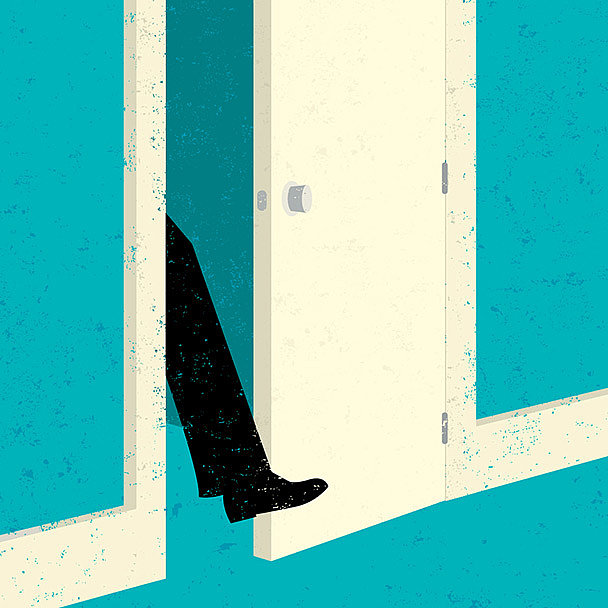
Way to Karls
Conditions

At Karls, we know that grades are not everything. Here, what counts above all is a person’s commitment and the values that define them – and that cannot be measured. The most important thing about your online application is therefore your letter of motivation. This is your chance to show us who you are and why you are a good fit for Karls. Karls is an officially accredited university and must adhere to the rules of the German registration authorities in the application process: Therefore, another prerequisite is a recognized secondary-school degree in Germany.
Help Center

I've put together a bunch of PDFs for most countries on the South American continent. Here you will find a step-by-step checklist for your journey to Karls – from your letter of motivation to how to apply for grants and scholarships and even the application form for a visa. Also, the exact requirements for your education are in the PDF for your country or your region. In addition, you will find in the PDF the contact details of the most important contact persons, e.g. your consulate or embassy. If at any point you feel unsure – don’t worry: I'm here for you.
International Foundation Year

Are you thinking ‘Karls is exactly what I want for my life’, but unfortunately are missing the appropriate degree? Maybe you also have a very good school diploma, but it is not recognized by the German registration authorities? Don’t despair! Many of my fellow students once felt the same way. The solution for you might be the Foundation Year: Within a year, you will learn all the necessary content and then take an exam. This means you’ll meet the admission requirements and can enrol at Karls. Wondering if a Foundation Year is also for you? Write to me and I'll explain everything else, including where and when you can do it.
Get in Touch

Karls-FAQ
https://karlshochschule.de/en/faq/
Ambassador (by me)
In Karlsruhe there is quite a big English-speaking community, generally speaking, most Germans speak a good command of English. It is taught in school from an early age and the digital generation has influenced a fluent command of English in many young people.
When I arrived in 2015, I didn't speak any German apart from the basic: "Hallo, Danke, Genau"
On first arrival: It isn’t a requirement since Karlshochschule International University is a 100% English environment with programs fully taught in English.
However…
I would encourage you to start asap. Learning German not only grants you a new language, it also introduces you to a new culture, it will help significantly with integrating into your new home. Furthermore, if a good command of German is achieved then job prospects are even better in one of the best job markets in the world currently (Baden-Württemberg especially has one of the strongest job markets in EU).
If you have no prior German language background, don’t worry. You have opportunities for learning the language at the Karls. German course is obligatory for all Bachelor programs but not for Master Programs. Not only German, other languages are also offered such as: Chinese, Arabic, French, Spanish, Russian, Italian are also offered for free at the Karls with flexible schedules.
It’s also important to note the employability benefits back in the U.K. and the rest of the world when having a second language! I would say generally it's uncommon for Brits to become fluent in a second language unless raised in a billingual environment. Becoming fluent in a second language can demonstrate a set of competencies to employers which, as a fresh graduate, could set you apart between you and the 50 other applicants who all applied for the same job...
In Karlsruhe specifically, there is a large English-speaking expat community, not just from the U.K. but also Ireland, South Africa, Australia, U.S, Canada and New Zealand. There is a total of 5 Irish Pubs in Karlsruhe which all have a variety of events such as: Pub Quizzes’, Live music, speaking tandem tables (Stammtisch), Sprach Café, several Facebook groups and forums for British ex-pats in Germany. Working in an Irish Bar whilst studying at the Karls gave me the opportunities to meet like-minded people in the same situation as me. This the nice aspect about moving away and can really help when being away from home.
While studying, a lot of our students also work part-time, whether it be as a student assistant at Karlshochschule, in the KarlsCafé or in one of the local shops, bars and cafés in the city center. International students may hold a part-time job to support their financial means but can only work a maximum of 20 hours per week as a working student “Werkstudenten”.
During the semester break you may work for more than 20 hours per week, if the job is scheduled for a short period of time (two months / 50 work days).
I worked in an Irish bar for the whole duration of my studies, I also did several iniatives at Karlshochschule which was enough for me to 100% support myself as a student.
Make use of the opportunities you have in Karlsruhe – sometimes this can be a great way to meet new people outside of the university, it can also help you meet German people and integrate into the city / culture.
Always check to see if there are jobs going at the Karls – it can be a really effective way of funding your lifestyle when studying full-time.
You can try to find a mini job at the University, there are quite some options as librarian, marketing support / content producer or being a barista at the Karlscafé – An Initiative – A small and cozy roof-top campus cafe right at the Karls, ran fully by Students.
Trying to look for work in a pub or bar is definitely something to recommend too.
Buy a Bike! Karlsruhe is the bike-friendliest city in Germany as voted by cyclists, you can get around easily to the whole city via bike as you will see when you arrive here. You definitely won’t need a car here, if you do there are several car-sharing apps and services available. A bike is cheaper than a tram ticket, it is healthier and with the hottest climate in Germany, it’s definitely more satisfying.
Embrace every opportunity that comes to you!
Germany in general and Karlsruhe specifically, is conveniently located in the heart of Europe. As an EU citizen or with an EU Schengen visa, you have the liberty of travelling throughout Europe freely. There are always special offers with Deutsche Bahn (DB) to certain cities, giving you the chance to enjoy a city break on a student budget (without jumping on a plane). This is a liberty we don't really have in the U.K. Where previously I would go down to London or up to Manchester for the weekend, now I could go to Munich, Paris, Prague, Zurich, Berlin and many more, all within 5-6 hours on the train or bus.
Alongside this, there are numerous swimming lakes around the city which are great in summer time and Karlsruhe is only 45 minutes away from the Black Forest.






